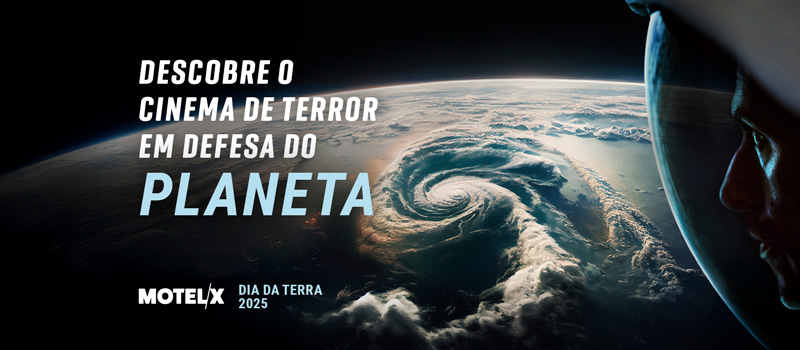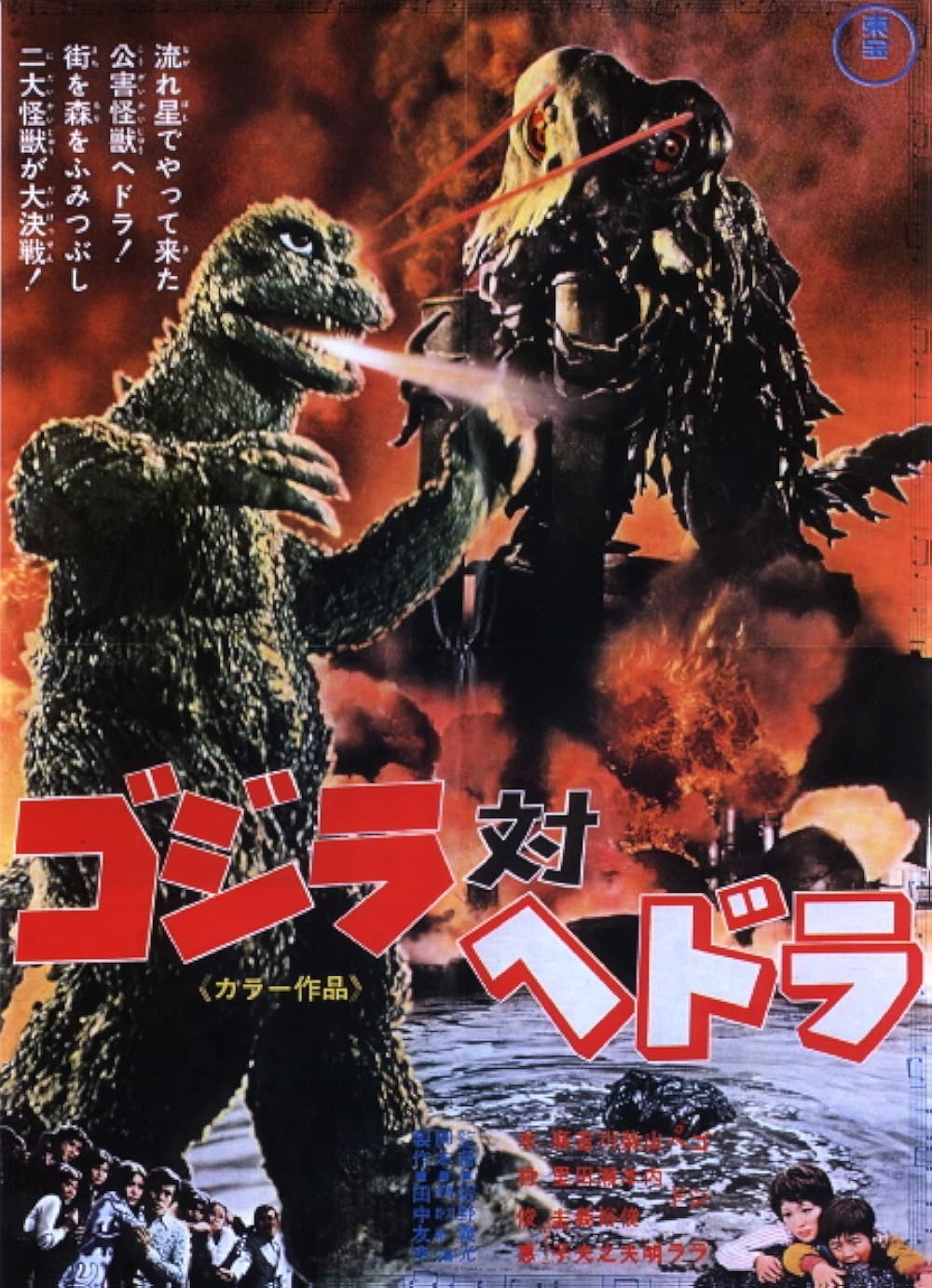News
Earth Day 2025: Horror in Defense of the Planet
On this Earth Day 2025, when more than ever, vile and cowardly threats, both known and hidden, conspire to destroy this beautiful little blue marble that serves as our home, we highlight the saving environmental message contained in countless memorable horror cinema titles, with a collection of eco-horror curated by the programmers of MOTELX.

Today is Earth Day. We live on Earth and without it we die. Today, from and about Earth, we will talk...
It is April 22, 2025, and the planet is experiencing increasing ecological deterioration, marked by an increase in serious natural disasters. In the past few days alone, catastrophic flooding in Bolivia has caused more than 50 deaths and displaced more than 100,000 people, following an unusually long rainy season. In Brazil, torrential rains and floods have displaced more than 580,000 people, while deadly heatwaves have hit Asia, the Mediterranean and Mexico. North America, in the midst of a period of ideological blindness, also faced the fury of an unaligned climate, with the Palisades fire in California becoming the third most devastating forest fire in the history of the state that is home to the former Hollywood "dream factory".
Despite clear evidence of the impacts of climate change, certain political figures and groups continue to downplay or deny the crisis. US climate denier organizations, revitalized by the steroid injection that was Trump's victory, are collaborating with far-right politicians in Europe to obstruct major climate reforms. However, there is significant global consensus on the need for action.
Horror cinema has identified this bundle of existential anxiety from the very beginning, appropriating the theme to intervene and raise awareness through the driving force of fear. Eco-horror is a subgenre of horror that focuses on the terrifying consequences of environmental degradation, portraying nature as an active and vengeful force reacting against human exploitation. These films explore ecological anxieties through narratives in which the natural world fights back—through monstrous creatures, subtle psychological breakdowns, and often through mysterious transformations of familiar landscapes. In essence, eco-horror reflects a deep cultural fear of losing control over the environment that we have long taken for granted, transforming the usually passive nature into a central character of fear and severe consequence.
The genre's roots go back to the 1950s, when postwar fears about nuclear fallout and scientific overreach gave rise to films in which mutant creatures — most notably the all-powerful "Godzilla" — are metaphors for environmental hubris. In the 1970s, growing ecological awareness led cinema to address human environmental abuse by staging the wrath of nature descending upon the characters; and the 80s and 90s bring a mix of eco-horror with sci-fi and psychological horror. Now in the 21st century we have more urgent and speculative stories rooted in climate change, extinction, and the emotional toll of living (subsisting?) in the Anthropocene.
Marking this Earth Day as a desperate appeal to the good instincts of this supremely imperfect primate that is man, the programmers at MOTELX have prepared a collection of 10 eco-horror films capable of giving us the nightmares that our environmental footprint deserves:
1) "Creature From the Black Lagoon" (Jack Arnold; 1954)
A strange prehistoric creature lurks deep in the Amazon jungle. A group of scientists tries to capture it and bring it to the "civilized world" for study.
"The archtypal '50s monster movie has been copied so often that some of the edge has gone, but... it's still entertaining, with righteous atmosphere and lupic underwater photography sequences."
Leonard Maltin

2) "Godzilla vs. Hedorah" (Yoshimitsu Banno, Ishirô Honda; 1971)
A toxic, ever-evolving alien life form from the Dark Gaseous Nebula is here to feed on our rampant pollution, and neither humanity nor Godzilla will be able to stop it.
"There have been a lot of Godzilla adventures since the original one in 1956 (...) my favorite is “Godzilla vs. Hedorah”"
Roger Ebert

3) "Phase IV" (Saul Bass, 1974)
Suddenly, desert ants form a group intelligence and declare war on humans. It's up to two scientists and a girl to stop them.
"good, eerie entertainment, with interludes of such haunting visual intensity that it becomes, at its best, a nightmare incarnate"
Jay Cocks

4) "Prophecy" (John Frankenheimer; 1979)
A government health inspector is sent to assess the damage a logging company is doing to a patch of forest claimed by Native Americans, and comes face to face with a creature of true terror incarnate.
"In an era of self-referential and cynical Scream horror movies and Silence of the Lambs knock offs, Prophecy has a certain something that just can't be denied. Prophecy even contains a MESSAGE (re: don't mess with Mother Nature or you'll be sorry), which is more than I can say for most horror movies produced today. Vastly amusing? You bet your bottom dollar"
Patrick Naugle

5) "C.H.U.D." (Douglas Cheek, 1984)
A bizarre series of sudden disappearances on the streets of New York City seems to point to something nasty living in the sewers.
"definitely one of the best kept secrets b movies"
Bloody Disgusting

6) "The Happening" (M. Night Shyamalan; 2008)
The trees seem to conspire against humans, and a science professor, his wife and a young girl struggle to survive a plague that causes those infected to commit suicide.
"I appreciate the quietly realistic way Shyamalan finds to tell a story about the possible death of man"
Roger Ebert

7) "Mother!" (Darren Aronofsky; 2017)
Surrealizing ecological nightmare in which a couple's relationship is tested when unexpected guests arrive at their home, interrupting their peaceful existence.
"Darren Aronofsky's toweringly outrageous film leaves no gob unsmacked. It is an event-movie detonation, a phantasmagorical horror and black-comic nightmare that jams the narcotic needle right into your abdomen."
Peter Bradshaw, The Guardian

8) "Annihilation" (Alex Garland, 2018)
A biologist enlists in a secret and dangerous expedition where the laws of nature do not apply.
"Kudos to Garland and the cast, but bravo to Scott Rudin for doing so well. Apparently you knew a master piece when you saw it, and you made sure we were able to see it well."
Richard Roeper, Chicago Sun Times

9) "In the Earth" (Ben Wheatley; 2021)
As the world searches for a cure for a disastrous virus, a scientist and a boy scout venture deep into the forest for a routine inspection of their equipment.
"brings us back to Wheatley's classic world of occult loopy weirdness and cult Britmovie seed, with a topical new dimension of pandemic paranoia"
Peter Bradshaw, The Guardian

10) "Gaia" (Jaco Bouwer; 2021)
A park ranger injured on a routine mission is saved by a father and son living off the grid. What initially seems like a rescue becomes more suspicious as the outsiders reveal a fanatical devotion to the forest.
"has a lot to say about humanity's destruction of the environment … but the film says it with creativity, mad flights of imagination, and even humor"
Sheila O'Malley

Many other films could be referenced here, and we hope to have many more years to do so, but as this subgenre indicates, we have no such guarantee...
In conclusion, what makes eco-horror especially relevant today is its ability to translate complex ecological crises into visceral and emotional experiences. As global environmental issues worsen, eco-horror channels society's guilt and fear into powerful allegories. It invites viewers not only to witness nature's fury, but to question their role in this chain of cause and effect.
In an era when real-world ecological collapse is no longer a distant fiction, eco-horror becomes a cinematic mirror of our greatest existential threat, reflecting both our anxieties and the urgent call for change. That’s why we call on your power and influence this Earth Day 2025.
It is April 22, 2025, and the planet is experiencing increasing ecological deterioration, marked by an increase in serious natural disasters. In the past few days alone, catastrophic flooding in Bolivia has caused more than 50 deaths and displaced more than 100,000 people, following an unusually long rainy season. In Brazil, torrential rains and floods have displaced more than 580,000 people, while deadly heatwaves have hit Asia, the Mediterranean and Mexico. North America, in the midst of a period of ideological blindness, also faced the fury of an unaligned climate, with the Palisades fire in California becoming the third most devastating forest fire in the history of the state that is home to the former Hollywood "dream factory".
Despite clear evidence of the impacts of climate change, certain political figures and groups continue to downplay or deny the crisis. US climate denier organizations, revitalized by the steroid injection that was Trump's victory, are collaborating with far-right politicians in Europe to obstruct major climate reforms. However, there is significant global consensus on the need for action.
Horror cinema has identified this bundle of existential anxiety from the very beginning, appropriating the theme to intervene and raise awareness through the driving force of fear. Eco-horror is a subgenre of horror that focuses on the terrifying consequences of environmental degradation, portraying nature as an active and vengeful force reacting against human exploitation. These films explore ecological anxieties through narratives in which the natural world fights back—through monstrous creatures, subtle psychological breakdowns, and often through mysterious transformations of familiar landscapes. In essence, eco-horror reflects a deep cultural fear of losing control over the environment that we have long taken for granted, transforming the usually passive nature into a central character of fear and severe consequence.
The genre's roots go back to the 1950s, when postwar fears about nuclear fallout and scientific overreach gave rise to films in which mutant creatures — most notably the all-powerful "Godzilla" — are metaphors for environmental hubris. In the 1970s, growing ecological awareness led cinema to address human environmental abuse by staging the wrath of nature descending upon the characters; and the 80s and 90s bring a mix of eco-horror with sci-fi and psychological horror. Now in the 21st century we have more urgent and speculative stories rooted in climate change, extinction, and the emotional toll of living (subsisting?) in the Anthropocene.
Marking this Earth Day as a desperate appeal to the good instincts of this supremely imperfect primate that is man, the programmers at MOTELX have prepared a collection of 10 eco-horror films capable of giving us the nightmares that our environmental footprint deserves:
1) "Creature From the Black Lagoon" (Jack Arnold; 1954)
A strange prehistoric creature lurks deep in the Amazon jungle. A group of scientists tries to capture it and bring it to the "civilized world" for study.
"The archtypal '50s monster movie has been copied so often that some of the edge has gone, but... it's still entertaining, with righteous atmosphere and lupic underwater photography sequences."
Leonard Maltin

2) "Godzilla vs. Hedorah" (Yoshimitsu Banno, Ishirô Honda; 1971)
A toxic, ever-evolving alien life form from the Dark Gaseous Nebula is here to feed on our rampant pollution, and neither humanity nor Godzilla will be able to stop it.
"There have been a lot of Godzilla adventures since the original one in 1956 (...) my favorite is “Godzilla vs. Hedorah”"
Roger Ebert

3) "Phase IV" (Saul Bass, 1974)
Suddenly, desert ants form a group intelligence and declare war on humans. It's up to two scientists and a girl to stop them.
"good, eerie entertainment, with interludes of such haunting visual intensity that it becomes, at its best, a nightmare incarnate"
Jay Cocks

4) "Prophecy" (John Frankenheimer; 1979)
A government health inspector is sent to assess the damage a logging company is doing to a patch of forest claimed by Native Americans, and comes face to face with a creature of true terror incarnate.
"In an era of self-referential and cynical Scream horror movies and Silence of the Lambs knock offs, Prophecy has a certain something that just can't be denied. Prophecy even contains a MESSAGE (re: don't mess with Mother Nature or you'll be sorry), which is more than I can say for most horror movies produced today. Vastly amusing? You bet your bottom dollar"
Patrick Naugle

5) "C.H.U.D." (Douglas Cheek, 1984)
A bizarre series of sudden disappearances on the streets of New York City seems to point to something nasty living in the sewers.
"definitely one of the best kept secrets b movies"
Bloody Disgusting

6) "The Happening" (M. Night Shyamalan; 2008)
The trees seem to conspire against humans, and a science professor, his wife and a young girl struggle to survive a plague that causes those infected to commit suicide.
"I appreciate the quietly realistic way Shyamalan finds to tell a story about the possible death of man"
Roger Ebert

7) "Mother!" (Darren Aronofsky; 2017)
Surrealizing ecological nightmare in which a couple's relationship is tested when unexpected guests arrive at their home, interrupting their peaceful existence.
"Darren Aronofsky's toweringly outrageous film leaves no gob unsmacked. It is an event-movie detonation, a phantasmagorical horror and black-comic nightmare that jams the narcotic needle right into your abdomen."
Peter Bradshaw, The Guardian

8) "Annihilation" (Alex Garland, 2018)
A biologist enlists in a secret and dangerous expedition where the laws of nature do not apply.
"Kudos to Garland and the cast, but bravo to Scott Rudin for doing so well. Apparently you knew a master piece when you saw it, and you made sure we were able to see it well."
Richard Roeper, Chicago Sun Times

9) "In the Earth" (Ben Wheatley; 2021)
As the world searches for a cure for a disastrous virus, a scientist and a boy scout venture deep into the forest for a routine inspection of their equipment.
"brings us back to Wheatley's classic world of occult loopy weirdness and cult Britmovie seed, with a topical new dimension of pandemic paranoia"
Peter Bradshaw, The Guardian

10) "Gaia" (Jaco Bouwer; 2021)
A park ranger injured on a routine mission is saved by a father and son living off the grid. What initially seems like a rescue becomes more suspicious as the outsiders reveal a fanatical devotion to the forest.
"has a lot to say about humanity's destruction of the environment … but the film says it with creativity, mad flights of imagination, and even humor"
Sheila O'Malley

Many other films could be referenced here, and we hope to have many more years to do so, but as this subgenre indicates, we have no such guarantee...
In conclusion, what makes eco-horror especially relevant today is its ability to translate complex ecological crises into visceral and emotional experiences. As global environmental issues worsen, eco-horror channels society's guilt and fear into powerful allegories. It invites viewers not only to witness nature's fury, but to question their role in this chain of cause and effect.
In an era when real-world ecological collapse is no longer a distant fiction, eco-horror becomes a cinematic mirror of our greatest existential threat, reflecting both our anxieties and the urgent call for change. That’s why we call on your power and influence this Earth Day 2025.




